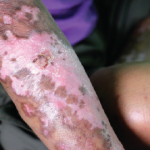NEW YORK (Reuters Health)—Rituximab seemed to be a safe and effective treatment for systemic sclerosis (SSc) in a placebo-controlled validation trial in Japan.1
“A number of studies have examined B-cell depletion therapy for systemic sclerosis, and many of them have suggested that [this] is effective in treating systemic sclerosis,” Ayumi Yoshizaki, MD, tells Reuters Health by email. However, until now, no placebo-controlled trials have shown the efficacy of the drug.
“We recognize that further studies are needed before rituximab can be accepted as a standard therapy for SSc worldwide,” Dr. Yoshizaki says, “[because] this trial was conducted only in Japanese patients.”
“Nevertheless,” he added, “we believe that the clinical trial we conducted will serve as a helpful model for many trials to be conducted in the future.”
As reported in The Lancet Rheumatology, Dr. Yoshizaki and colleagues conducted a randomized, placebo-controlled trial in 56 individuals at four hospitals in Japan.1
Patients had a mean age of 49; about 96% were women; all fulfilled the 2013 ACR/EULAR classification criteria for systemic sclerosis, with a modified Rodnan Skin Score (mRSS) of 10 or greater; and had an expected survival of at least six months. They were randomly assigned (1:1) to receive intravenous rituximab (375 mg/m2) or placebo once weekly for four weeks.
The primary endpoint was the absolute change in mRSS 24 weeks after initiation of treatment, measured in all patients who received at least one dose and had one endpoint assessment.
Almost all (96%) patients in the rituximab group 79% of those in the placebo group received at least one dose of their allocated treatment and completed 24 weeks of follow-up.
The absolute change in mRSS at 24 weeks was lower in the rituximab group than in the placebo group (-6.30 vs. 2.14).
Adverse events were similar in both groups and occurred in all patients in the rituximab group and 88% of those on placebo. The most common adverse event was upper respiratory infection, which occurred in 39% of those taking rituximab and 38% of those on placebo.
One serious adverse event leading to treatment discontinuation occurred in one patient in each group (decreased serum albumin in the rituximab group and biliary enzyme increase in the placebo group).
No deaths occurred during follow-up.
Dr. Yoshizaki notes, “It is true that rituximab is an effective drug for systemic sclerosis, but after many years of continuous administration, the levels of gamma globulin in the blood will decrease. This leads to an increased susceptibility to infections.”

